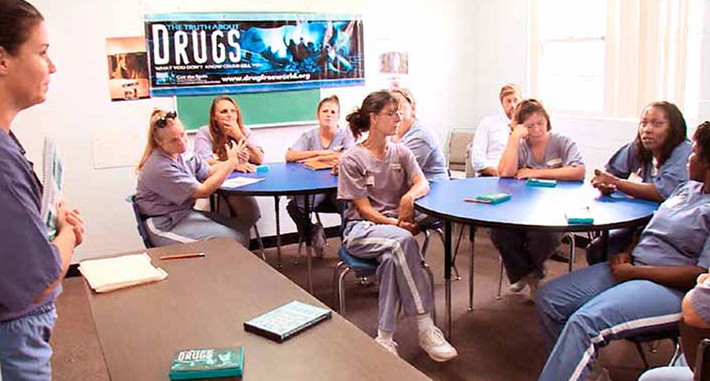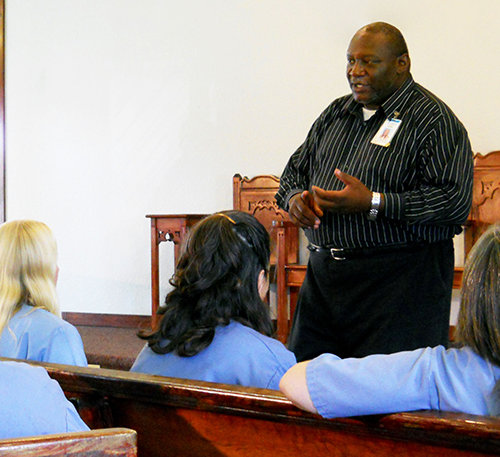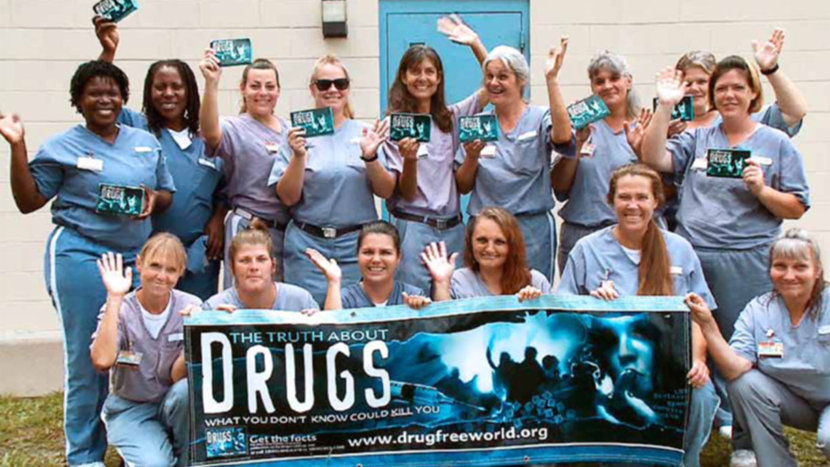Drug Education Behind Bars
In-your-face Program Helps Inmates Learn the Truth

One day a few years ago, the assistant warden of the Hernando County Correctional Institution for Women in Florida stopped to get her hair done at a local salon. Her hairstylist, she soon learned, was a dedicated volunteer with the Florida chapter of Foundation for a Drug-Free World and its worldwide Truth About Drugs program. The warden left the salon not only with a haircut but a Truth About Drugs DVD, which she turned over to her education director, Andre Buford.
Shortly thereafter, the assistant warden and Buford attended a Hernando County School Board meeting where the full Truth About Drugs program was presented—the videos, the booklets on each commonly used drug, and a full curriculum for use in any classroom setting. Fifteen minutes into the presentation, Buford knew he had found the perfect program for the women in his prison.

He knew that the inmates, many of whom are also mothers, would identify with the program, an in-your-face approach that shows, through real-life stories, what drugs can do to a person, as well as their dire implications for the user’s family and friends. “That’s what the youth of today need,” he said. “They need to know what they are doing to themselves and how their family is going to feel. They need to know that by using drugs they are destroying their own families, and drugs are something they should not do.”
Therefore, with the blessing of his assistant warden, Buford began implementing the program with the women prisoners under his charge. It began as a pilot program with 14 women and has evolved into a standard part of the prison’s programs, with dozens of graduates.
The lesson plans, Buford said, generated extensive thoughtful feedback from the inmates. Their homework consisted of reviewing each day’s class discussion and coming the next day with their own summary of the important points and, most significantly, how they could apply it to their own life. Due to turnover in the prison population, the usual 13-week Truth About Drugs program was tailored to eight weeks. Soon inmates themselves led the program, passing on the message to other inmates that this was the place to be.
Buford was so gratified by the positive results he achieved with the materials, he wrote to the Foundation for a Drug-Free World: “This material should be a requirement in every public, charter and private school across the nation.”
One inmate wrote that the program “gave me knowledge. It gave me understanding.” Completion of the program, she said, “will allow me to remain drug-free and my children will now have a mother who is no longer addicted to drugs.”
Buford has since moved on from the Florida penal system and now serves as executive director of a Tampa-based nonprofit that helps individuals and families. He not only left to his successors a flourishing Truth About Drugs program, now enrolling 34 inmates at a time on average, he also brought it with him and implements it in his new position outside of prisons to reach kids and families before drugs do.
“[the program] gave me knowledge. It gave me understanding. [Completion of the program], will allow me to remain drug-free and my children will now have a mother who is no longer addicted to drugs.”

FACTS
“Smart” Drugs
The not at all “Smart Drugs”—brand-name or generic amphetamines such as Concerta, Adderall and Modafinil, are abused by some teens who think the drugs will help them get through exams. Wrong, say university studies. Abuse of these prescription stimulants is most prevalent among underperforming students who hope to improve their grades through drugs. However, a University of Pennsylvania study found that those who took stimulants showed no performance gains on a series of tests that measured factors such as creative working memory. The users only thought the drug was helping them, while in fact it was found in some to reduce performance. A Drexel University study found that users of these drugs risk long-term impairment of brain function.
EFFECTIVE DRUG EDUCATION SAVES LIVES
Support the Foundation for a Drug-Free World and help protect young lives from the destructive effects of drugs. Your contributions enable us to make our educational materials available free of charge to schools, youth organizations and other groups and individuals. Your support helps empower people with the facts they need to live healthy, drug‑free lives.




